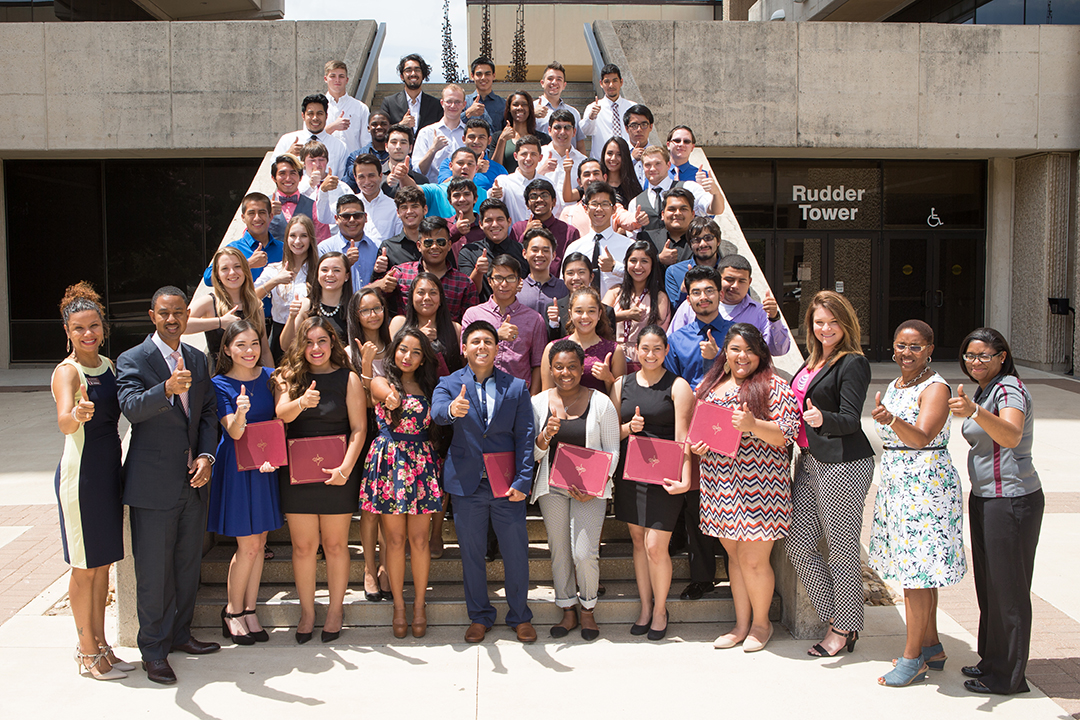
Making the transition from high school to college can be difficult for many students. For first-generation college students the transition is often even more challenging. A new five-week summer program helped bridge the gap from high school to college for 51 first-generation students at the Texas A&M University College of Engineering this fall.
The Summer Bridge Program, sponsored by the AT&T Foundation, allowed these students, who are also University Regents’ Scholars, the opportunity to live on campus while getting a head start in their course credits with an Engineering Fundamentals class. The students also went on tours of campus and learned about tutoring and other resources available to them.
On Aug. 4, friends and family came together for a graduation ceremony at Texas A&M, where those 51 students were honored for their hard work with a certificate.
“I’m a first-generation college student,” said Carmelo Bustos, an incoming freshman from Houston who spoke during the ceremony. “Being a first-generation student is a pretty big deal because your parents expect a lot from you.”
Bustos said he appreciated the opportunity to get one math course out of the way and he added that he hopes future first-generation students will be afforded the same opportunities.
“We learned how to apply our calculus into engineering activities, with the help of our professor,” he said. “College is pretty different from high school, and this program has helped me a lot.”
Nathan Cuellar, an El Paso, Texas, native, who came from a high school where the graduating class had only 36 members, said he was very nervous about transitioning to a university with almost 60,000 students.
“When I learned about the Summer Bridge Program I realized that this was the answer,” he said. “This program was everything I could have ever asked for or wanted or needed.”
Cuellar said he enjoyed the opportunity to meet other incoming freshman before classes begin.
“We all want to be engineers, so that brings us together,” he said. “We all have different majors, different ambitions, but we’re all trying to change the world in one way or another. That’s a goal we all share.”
Houston native Estefany Martinez said she feels confident to begin college this fall.
“As a first-generation student, I feel this program helped me become more aware of the resources on campus,” she said. “The different sessions we attended throughout the weeks provided us with information about clubs and organizations as well as other resources.”
Corey Anthony, senior vice president of Global Emerging Services at AT&T, spoke during the ceremony, telling the students that companies like AT&T are interested in hiring talented engineers. Anthony, class of 1994, said AT&T hires more graduates from Texas A&M than from any other university.
“For you to have a viable and successful career, you could not have started in a better place — studying science, technology, engineering or mathematics at Texas A&M,” Anthony said.
Dr. N.K. Anand, executive associate dean of engineering, pointed out how the Summer Bridge Program reflects college of engineering’s 25 by 25 Initiative. The college’s controlled growth initiative seeks to offer a transformational educational experience to address the national and state need for more engineers and to better prepare these students for the changing needs of the engineering workforce.
The college is providing an opportunity for more qualified students to pursue an engineering education at Texas A&M by enrolling 25,000 engineering students by 2025. The students will include undergraduate and graduate students on the College Station, Galveston and Qatar campuses, as well as students pursuing online graduate degrees.
“We want to see all of you graduate with an engineering degree in four years,” Anand said.
As Regents’ Scholars, these students are also required to participate in the Engineering Success Program first-year seminars under the Access and Inclusion Program in the College of Engineering. The 51 students who took part in this program begin classes as freshmen engineering students Aug. 29.